KILLING FISH (PART ONE)
The Lawless Oceans — forced labour on rust-bucket boats docking at Cape Town harbour
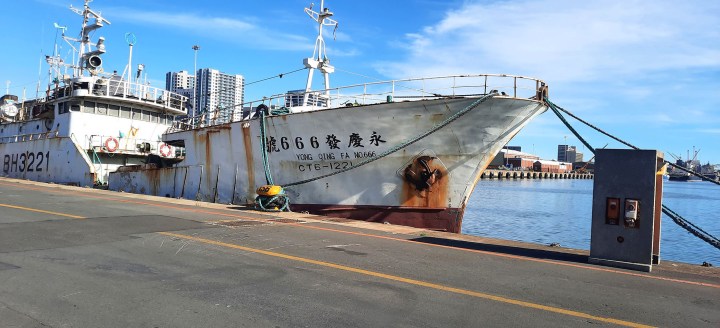
Foreign fishing boats docking in Cape Town do so behind a veil of secrecy. Crews are often only in port for a few days, their passports withheld and visits by locals are not easily permitted. Behind that veil are deaths at sea, suicide, shocking working conditions, unlicenced boats flying flags of convenience, contract violations, insufficient food and verbal abuse and at times cruel beatings by captains. These fishers are engaged in one of the most dangerous jobs in the world which is estimated to kill up to 100,000 a year. It’s gruelling work with accusations of forced labour, human trafficking and slavery. But in international waters, as long as the fish keep coming, who cares?
An alien civilisation coming across our solar system would name our planet Ocean, for most of Earth is under water. Being air-breathing and living on the bits that stick out, we mostly regard the vast liquid blue that surrounds us as a beautiful but often scary “other”. Billions of us, however, rely on it for food. This is Part One of a series about the relationship between the creatures below the sea’s surface and the people in boats who catch them. Read Part Two
Rust eats metal and on the Hong Iu 313 there was so much it was surprising the long-line fishing boat held together enough to brave the sea. I (Don) stepped onto deck and found the ragged crew tying hooks to nylon lines coiled on the filthy deck. There was an acrid smell of diesel, fish and sweat.
The customs man I’d accompanied called for their passports and they began lining up. There was hardly any of the sort of joshing you’d expect from a group of men who’ve worked together for years. Most of them looked very young and all seemed nervous.
I wasn’t supposed to be there. Cape Town port authorities don’t permit people not on ship business to enter and captains of foreign fishing boats refuse access to anyone they don’t know. I had tagged along with the customs officer and tried to look like his unobtrusive assistant. While he checked, gathering everyone on the foredeck, I moved off to explore.
The Hong Iu 313 is flagged as Taiwanese and based in Kaohsiung. The crew were mostly Filipino. She’s not a neat vessel. Its narrow decks were littered with rope and pipes, paint was peeling on the bulkheads and many areas were red with rust.
I ducked through a door into a narrow passageway that gave access to a tiny, grubby kitchen and a mess room where a woman was counting out piles of R100 notes.
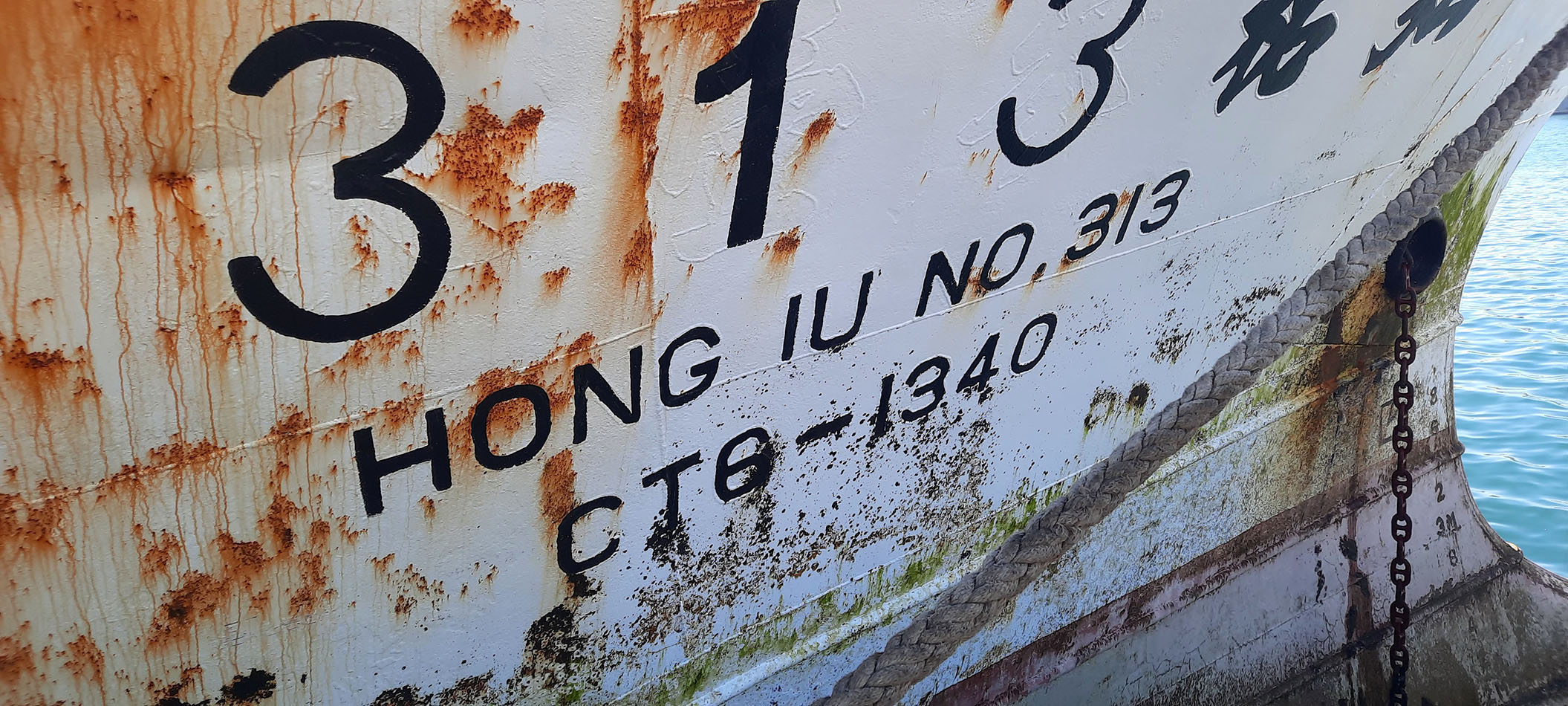
When it docked at Durban the Hong Iu 313 was considered unsafe and its captain was fined. (Photo: Don Pinnock)
Insanely cramped cabins led off of the room, each with four bunks that looked as though stretching out would be impossible. They had a damp, sweaty smell. Clothing and blankets were strewn about, there seemed to be no storage space and the portholes were covered with cardboard, no doubt to allow the day shift to sleep.
The Hong Iu 313 is also not a happy boat. Following complaints by the crew, it had been detained six months earlier in Durban by inspectors of the South African Maritime Safety Authority (Samsa) under provisions of the ILO’s Work in Fishing Convention, C188. Problems included lack of documentation, poor accommodation, insufficient food, poor safety and health conditions and no crew list. Lifebuoys were rotten, the sole anchor was not operational (there should have been two).
The inspectors were particularly concerned about the vessel’s stability. It was declared unseaworthy and all crew were evacuated following the first inspection. It was released from detention once it had been stabilised, repaired and the other issues addressed. The owner of the vessel also paid a detention fee of R12,365.
Six months later, when I encountered the Hong Iu 313 at port in Cape Town, a second Samsa inspection had taken place. Some changes, like repair to rotten lifebuoys, had been made, although little else seemed to have changed. The crew complained that the captain had been physically abusive to the cook, kicking him whenever he made a mistake, and that the captain’s relationship with the crew was generally intolerable. One crew member said that if he could not leave the boat he would jump overboard.
According to a newsletter by the Catholic Stella Maris organisation, which serves foreign crews, the crew said they had also not been paid in a consistent manner and often not in full. Food, they were told, consisted of noodles, rice and pork bones with occasional fish. If chicken was served, two would be split between 24 crew. Drinking water was unclean, broken gear was not replaced and crew needing medical attention were provided with only traditional Chinese medicine which offered no relief.
There may have been much more to tell, but Stella Maris reported the interviews were being held in plain sight of the captain.
When Samsa inspected the boat in Cape Town, it ensured that crew who wanted to go home could and issued the boat a clean bill of health. As you read this, it’s fishing southeast of Cape Town.
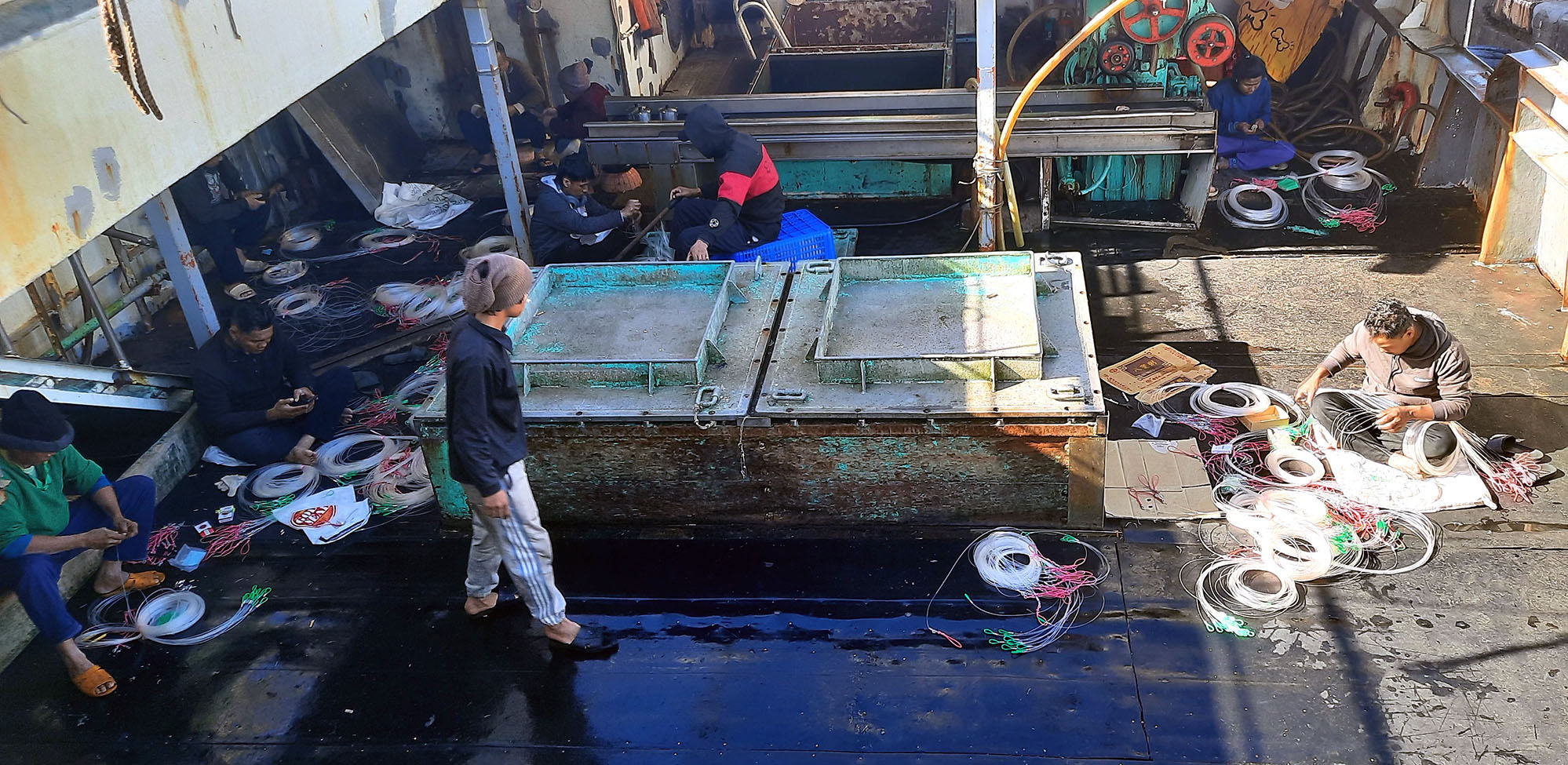
Thousands of longlines drop millions of baited hooks into the sea every day. (Photo: Don Pinnock)
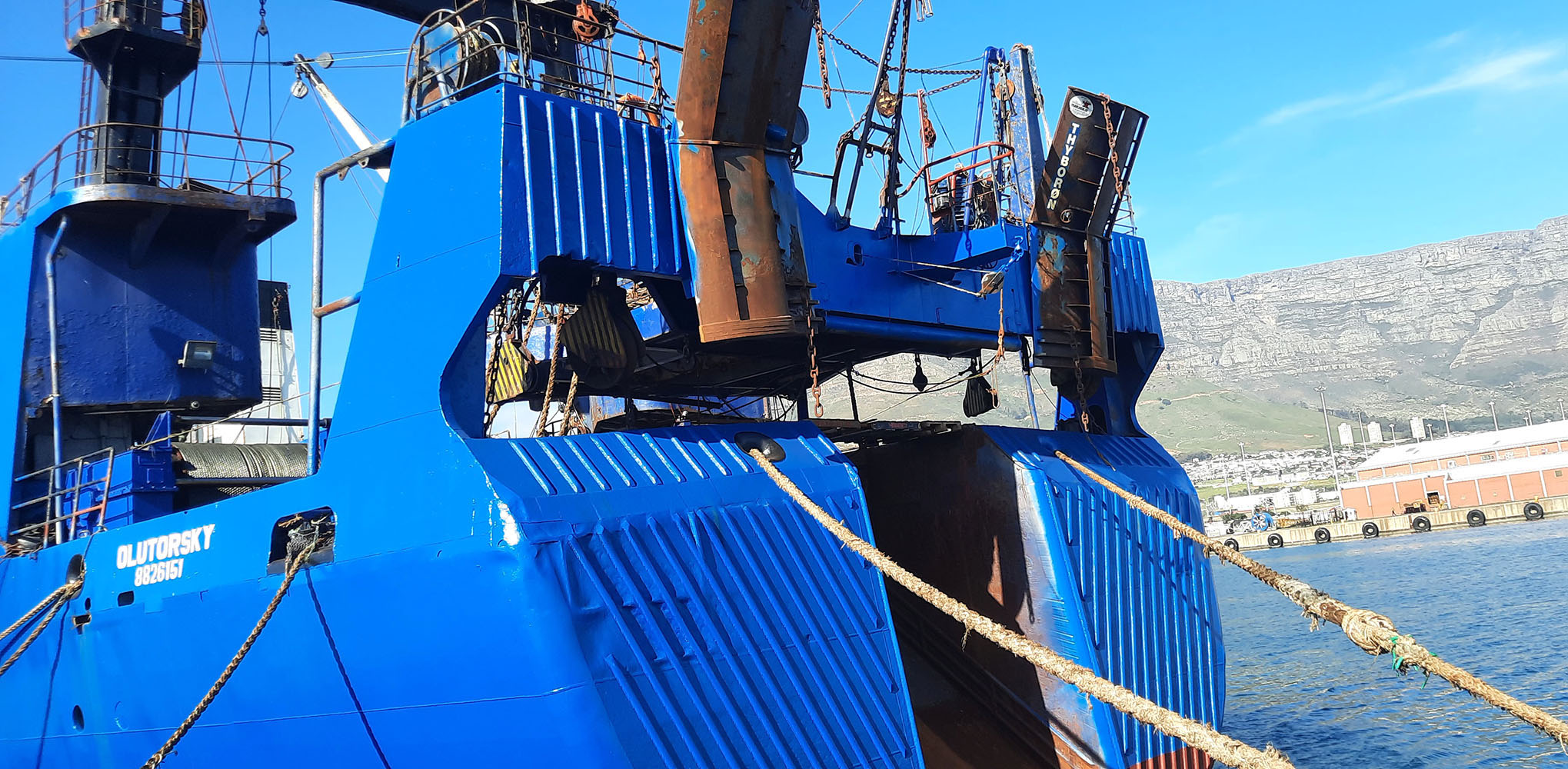
Russian stern trawler flagged as from Cameroon. (Photo: Don Pinnock)
The Hong Iu 313 is not an exception but the norm among tens of thousands of boats stripping the world’s oceans of fish. Most crews in the South Atlantic are contract migrant labourers from the Philippines and Indonesia. That they work under the conditions they do for the pay they get says much about the state of the economies of the countries from which they come.
Sad record
In Cape Town, the more we looked into crew conditions on mainly Taiwanese, Chinese and Japanese-flagged fishing boats, the worse it got. I (Melissa) am based at the School of International Development and Global Studies at the University of Ottawa and have been researching fishing labour practices in Asia, Ireland and elsewhere.
I interviewed some of the crews in Cape Town through a translator and sourced others through reliable sources who cannot be named because crews and other informants fear victimisation or worse. We checked them out and found them to be reliable, many the result of lengthy interviews by informants who shared the information with us on condition of anonymity. These are some of the issues and events that were raised.
In 2021, Ricky Balbino, a Filipino on the Thai fishing boat San Carlos 3 operating off Cape Town, died of a ruptured appendix. A fellow crew member, not named, had earlier died of “an intense headache”, and a crewman on Senshu Maru 03 committed suicide by jumping overboard. The captain of Ching Chang Long, Guo Quan Xi, was found dead in his bathroom. He had previously been accused of abusing his crew.
Read more: Fisheries crime is a huge parallel economic system – FishFORCE is harnessing tech to fight it
In September 2022, a young fisher on the Taiwanese trawler Jan Lih 212 died while working and in February 2023 a Filipino, Jayron Villanueva, died in his sleep after a 20-hour shift on Chin Chang Long. When it docked several crew asked to be flown home or changed to another vessel because they feared for their lives “due to death incidents”.
Aboard the Hang Chuan 212 a crewman named Ernesto JoviJo reportedly “went mad” and another, on the Taiwanese longliner Hsiang 101, “lost his mind”. On that boat the captain refused crew access to the toilet, forcing them to use a hole in the deck. The ceiling of the cabins leaked when it rained, the drinking water was unclean and everything was rusted.
Reports are common of 20-hour shifts, insufficient food or protective gear, failure to fly fishers home after the completion of contracts, withholding of passports while in port and shocking working conditions and accommodation.
These are just a few reports filtering into a single port, Cape Town, among the many at which boats dock along the fringes of the vast southern Atlantic fishing grounds. They include details of beatings by captains and bosuns of the thousands of mainly young Filipino and Indonesian workers. Time after time these crews tell of dangerous working conditions and verbal and racist abuse.
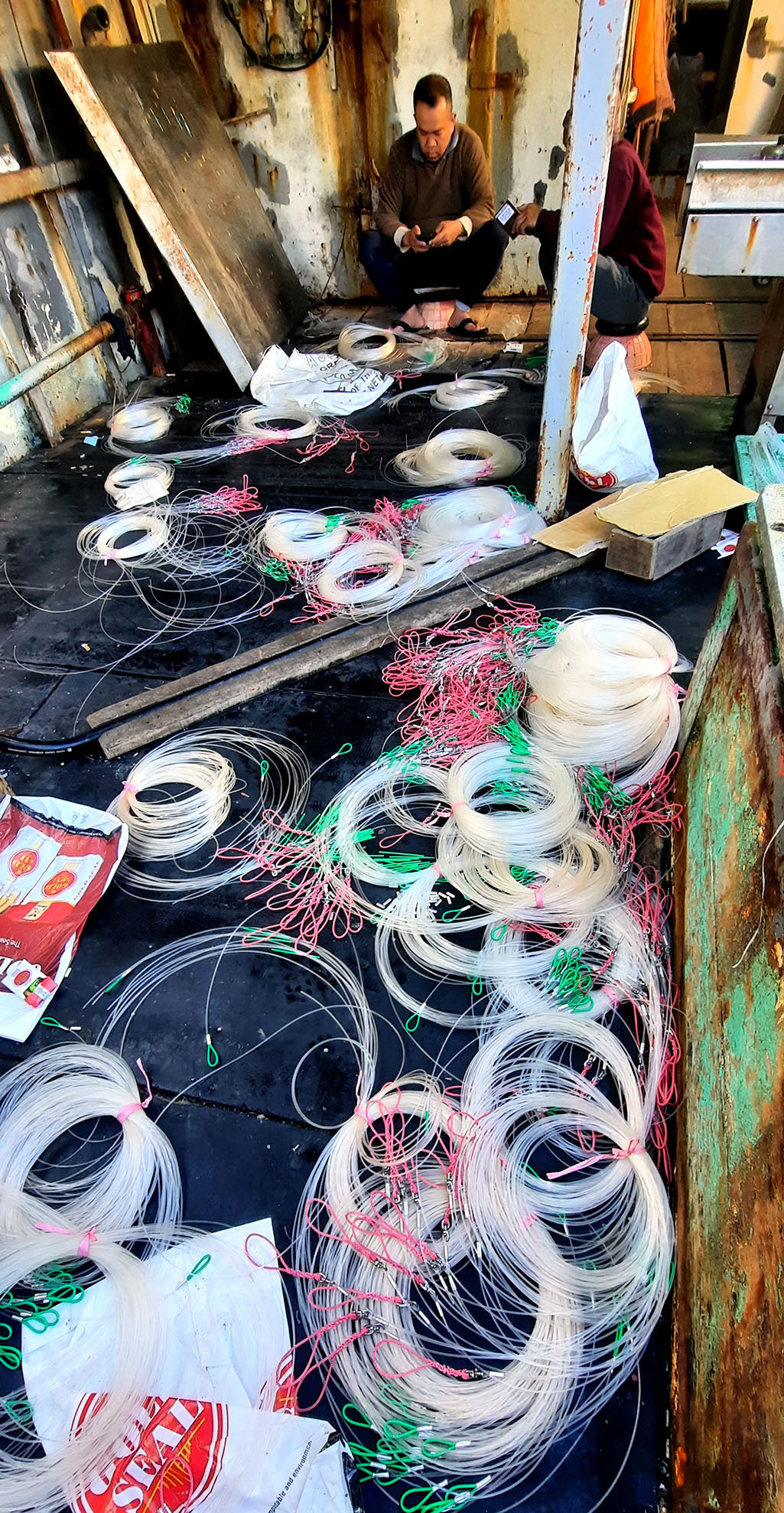
Preparing hooks for a longline which often catch seabirds and unwanted bycatch. (Photo: Don Pinnock)
Fishing frenzy
With the northern waters depleted of fish, the South Atlantic – the only region of the world’s oceans without a functioning UN regional fisheries management organisation – is now under siege from legal and unregulated foreign fishing activities.
The International Transport Workers’ Federation (ITF) warns that an overfishing catastrophe is looming. According to a report by the UN Food and Agriculture Organization (FAO), the annual global marine fish catch was 78.8 million tonnes in 2022. We will investigate the state of fish in the fourth article in this series.
The fishing frenzy is having a detrimental impact on labour conditions. The human cost of the fish on our plates is almost unimaginable and deeply worrying, but the industry is so complex and widespread that precise numbers of people involved are hard to obtain.
Our World in Data, which collects fishing statistics, estimates that 39 million people are employed in the wild catching of fish, and 21 million in fish farming and over the past 10 years this has increased rapidly. For those in boat-based fishing this includes 37% engaged full time, 23% part time and the rest working as either occasional fishers or those of unspecified status.
To avoid fishing vessels making too many return trips between the coast and the high sea, other vessels come to collect the fish caught and bring the goods back to port. This practice can result in crew remaining at sea for years at a time.
The FAO estimates are similar at about 58.5 million people engaged in the global fishing sector, 15 million of them working on an estimated 4.1 million fishing boats at any one time. Of the total, about 5.6 million fishers are African, but the majority, 49 million, are from Asia. Perhaps 100,000 or so of all fishers globally are migrant workers, although the FAO says exact numbers are not known.
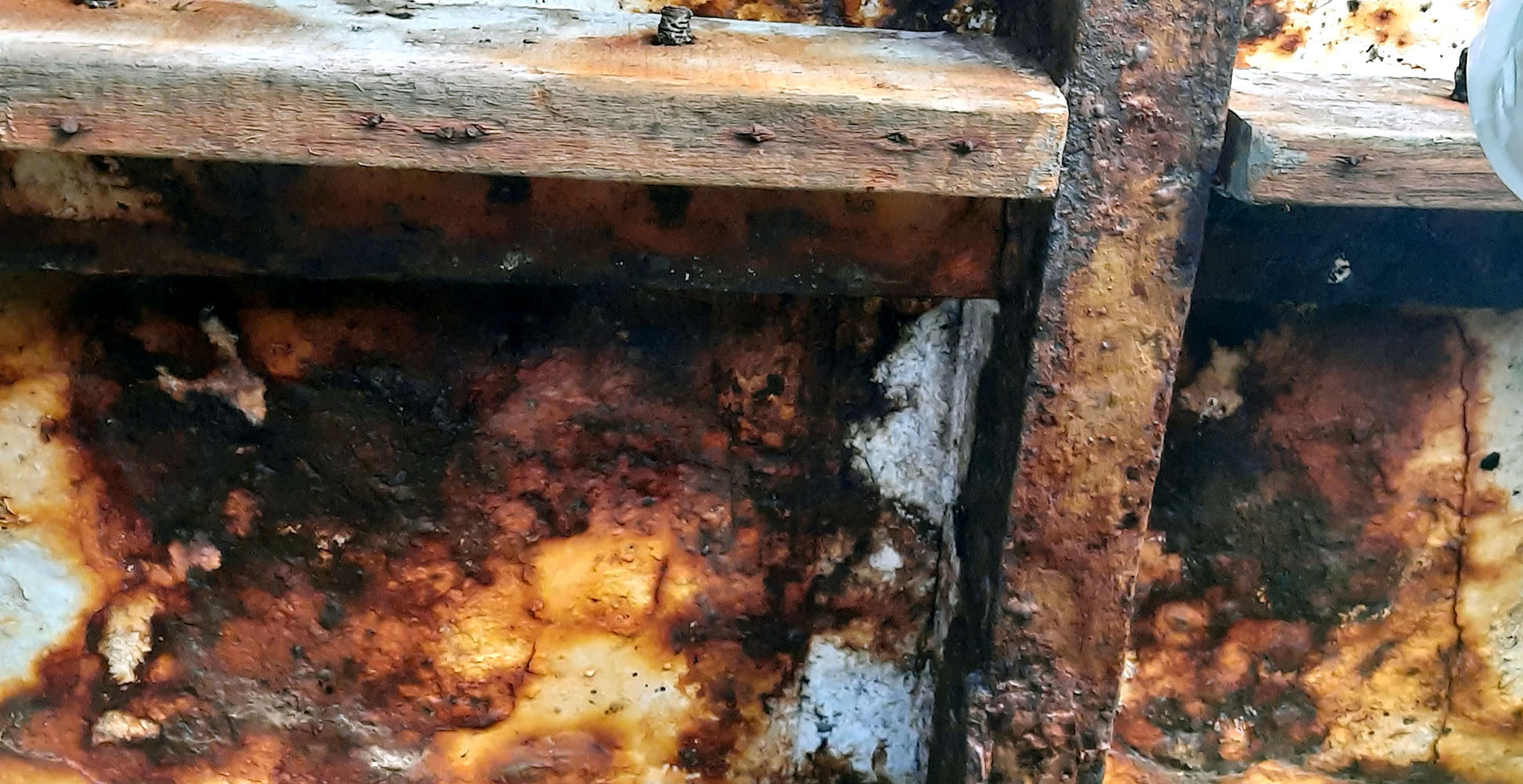
On the Hong Iu 313 there were high levels of rust everywhere. (Photo: Don Pinnock)
Taiwan’s deep-water fleet consists of about 1,100 boats and roughly 20,000 migrant workers (mostly from Indonesia, but also the Philippines plus fewer from Vietnam and Myanmar). China’s fleet is bigger – about 3,000 boats – but we don’t know the number of migrant or Chinese fishers working on it.
Fishing has long been known as one of the world’s most dangerous professions. Among fishers on the high seas, the International Labour Organization (ILO) conservatively estimates that each year about 24,000 die in the global fishing sector through accidents, overwork or when unseaworthy boats sink.
However, a study by the FISH Safety Foundation, analysing news, investigative articles and social media about fishing safety and reviewing responses to information requests from government officials, put the figure far higher – about 100,000. It says most are avoidable and a huge percentage officially unrecorded.
The study shows that these deaths and injuries disproportionately victimise impoverished people in low-income countries, which is why they’re so seldom noted. To survive, these men have no alternative but to work on poorly equipped, unregistered boats engaged in dangerous behaviours chasing depleted fish stocks.
Migrant workers can be treated like “disposable resources” while vessel owners have only one objective: catching as many fish as possible to make the biggest profits.
Duncan Copeland, a senior campaigner at the Environmental Justice Foundation (EJF), who boarded a South Korean-flagged trawler with naval forces from Sierra Leone, described what he saw as horrendous.
“The men were working in the fish hold with no air or ventilation in temperatures of 40-45 degree C. It was rusty, greasy, hot and sweaty. There were cockroaches everywhere in the galleys and their food was in disgusting boxes. All they had for washing was a pump bringing up salt water. They stank. It was heart-breaking.”
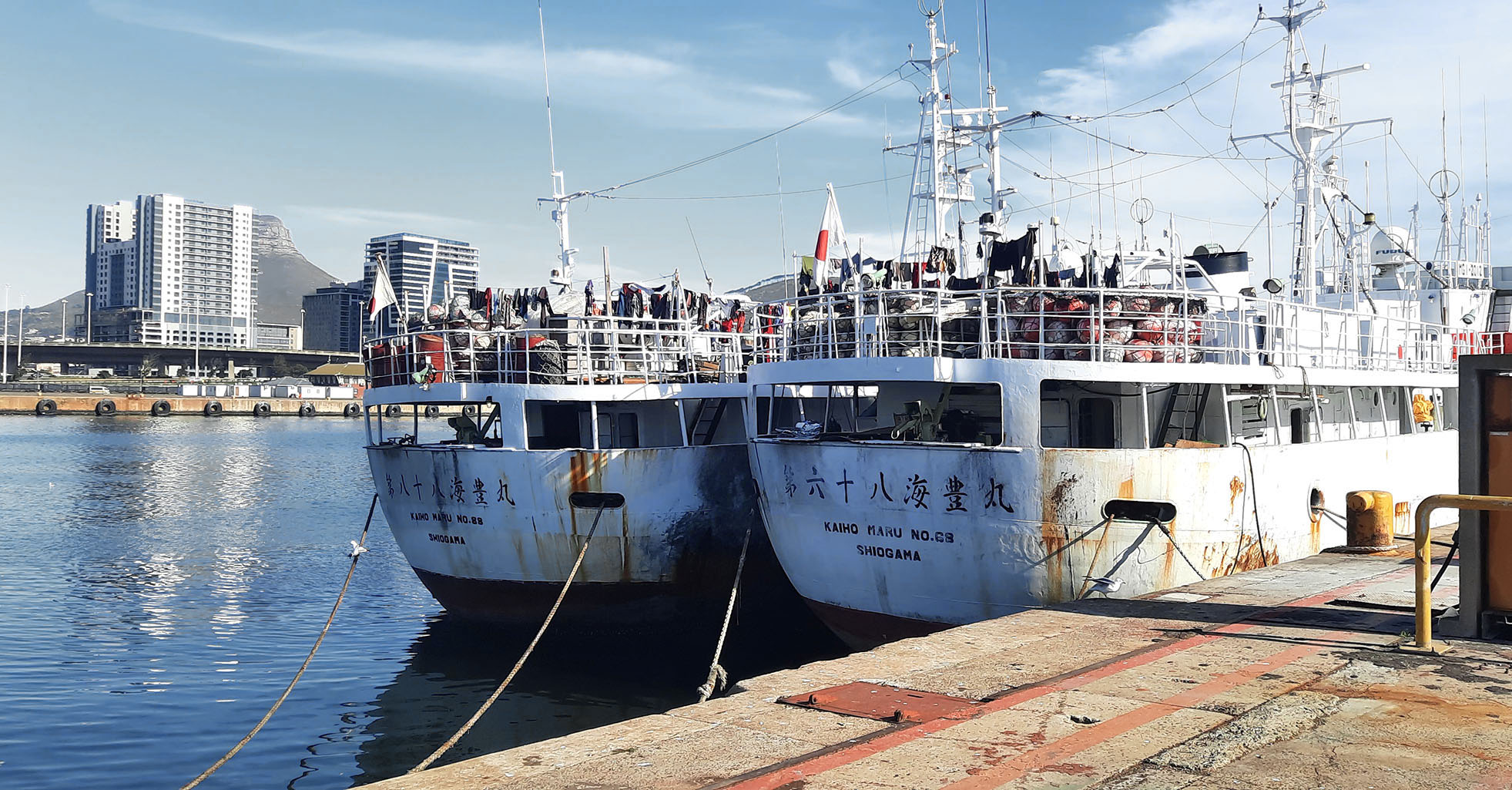
Japanese fishing boats in Cape Town Harbour. (Photo: Don Pinnock)
Taiwanese owners often buy old Japanese boats but flag them as Japanese. In this way they get around Taiwan’s revised fisheries regulations that were imposed after a series of shocking revelations prompted in part by Greenpeace East Asia campaigns.
The EJF also found vessel after vessel along the African coast engaged in pirate fishing, some up to 40 years old, rusted and in terrible repair.
Disposable resources
Many migrant workers incur significant debt well before going out to sea. There are cases of recruitment agencies seeking out the poorest workers they can find, offering them contracts and the possibility of work abroad. Some agencies demand large sums of money up front as recruitment fees, payable as a debt against future wages. More experienced fishers change agencies, terms and captains, whereas new recruits take what they can get.
Documents are signed and before they know it, workers from Indonesia, the Philippines and Cambodia find themselves working on fishing vessels in deplorable conditions where they can be forced to work for years to pay off their debts. The United Nations describes this practice as forced labour.
Migrant workers can be treated like “disposable resources” while vessel owners have only one objective: catching as many fish as possible to make the biggest profits. While some crew-captain relations are good, and there are cases of crew making a decent living from fish work, even in best-case scenarios this is persistently difficult work with long working hours.
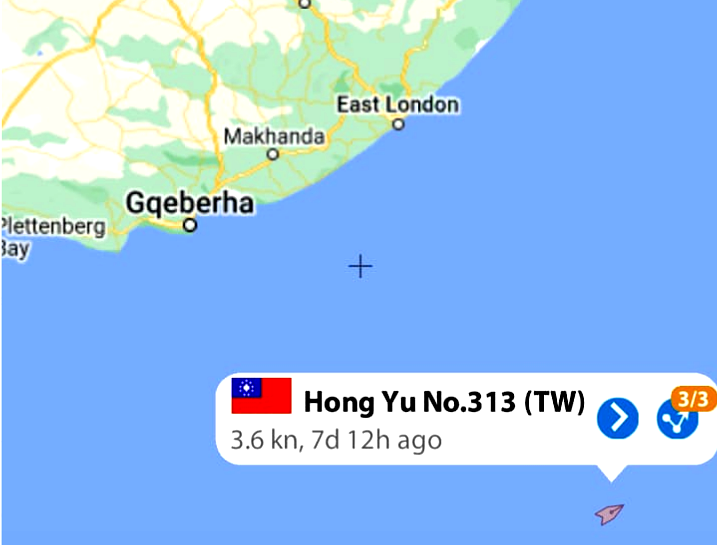
(Image: Google Earth)
Crews docked in Cape Town said that while longlining they had on occasion worked for 32 hours without sleep when fish were abundant. When coffee and sugar ran out they had to buy it from the captain. Medical supplies were insufficient: some crew brought their own medical supplies, but couldn’t anticipate all health issues. Some men complained of intense toothache. In port they were paid in South African rands but couldn’t send it home because they had no entrance stamp in their passports so banks refused to deal with them.
Salaries vary greatly, generally starting at about $500, although some crew spoke of salaries as low as $190 a month. Salaries only improve with significant time and experience at sea.
The agency, they said, did not support them in the face of violations of contracts by captains, putrid food and insanely long working hours. They also failed to notify families when fishers “disappeared” at sea.
While at sea, crews seek opportunities to make extra money. At the end of one fishing contract, a fisher noted that he made an extra $300 through shark finning. “We throw away the body and fins go for about $25 a kilogram… no one inspects the vessel.”
If poor working conditions were not enough, migrants working on fishing boats are often at the mercy of unscrupulous outfits known as manning agencies – essentially recruiters. Fishers find it difficult to coordinate between a boat owner and a “manning” agency. These agencies vary widely and are tough to negotiate with. Crew members explain that often you have to pay to get on cargo boats so you need to start in fishing to “prove your sea legs”.
A number of crews in Cape Town mentioned a Philippines-based agency, which they heard had been red-listed by the ITF. They said their families had not received their allotment fees and there seemed a slim chance of getting their hard-earned salary being held by the recruiter.
The fishers complained that the agency often refused to fly them home when their contracts ended and induced captains to bribe them to extend contracts for another year. There were cases of the agency promising a wage on recruitment that ended up 40% lower when workers arrived at their destination.
The agency, they said, did not support them in the face of violations of contracts by captains, putrid food and insanely long working hours. They also failed to notify families when fishers “disappeared” at sea.
Beyond unscrupulous recruitment agencies, transhipment at sea is another challenge facing crews. To avoid fishing vessels making too many return trips between the coast and the high sea, other vessels come to collect the fish caught and bring the goods back to port. This practice can result in crew remaining at sea for years at a time. In Cape Town some crew spoke of being at sea for more than two years before returning briefly to port, either at the end of a contract or for offloading fish.
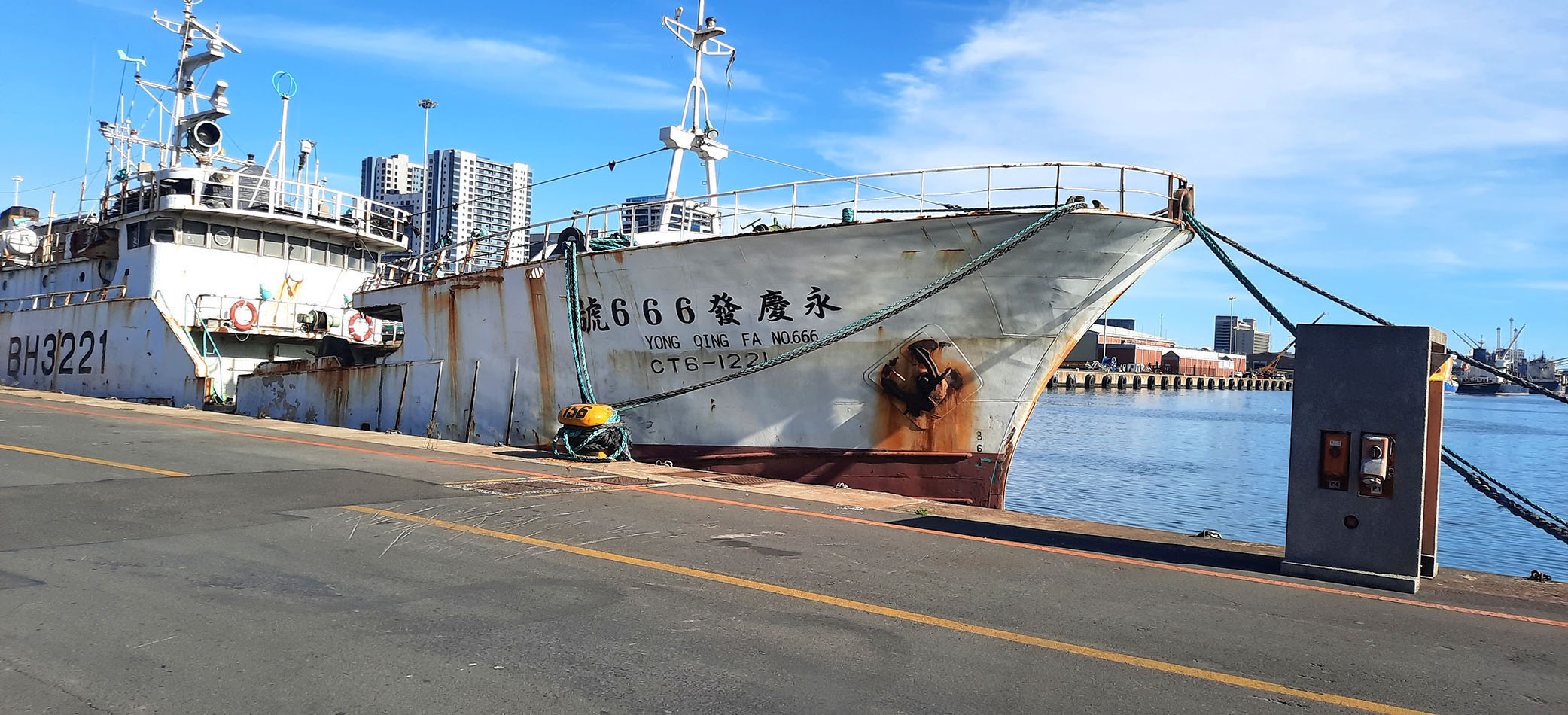
Four crew members were stranded and living aboard this Taiwanese-registered boat abandoned by its owners and detained by South African authorities who found it to be unseaworthy. (Photo: Don Pinnock)
Are there solutions?
The seas and oceans cover more than 70% of our planet and have no borders. These problems cannot be solved individually. This is a major challenge for thousands of migrant workers who may be abused by their captains on the world’s oceans every day. Dwindling fish resources combined with growing demand is making this issue increasingly urgent.
Fighting for fish increases competition and reduces compassion or a desire to stick to the rules. This is bad news for both crews and the creatures they hunt.
However, faced with international pressure, several countries have taken steps to improve working conditions on fishing vessels. Thailand, which has been particularly singled out for criticism in recent years, has been trying to better regulate its industry since 2015. So has Taiwan.
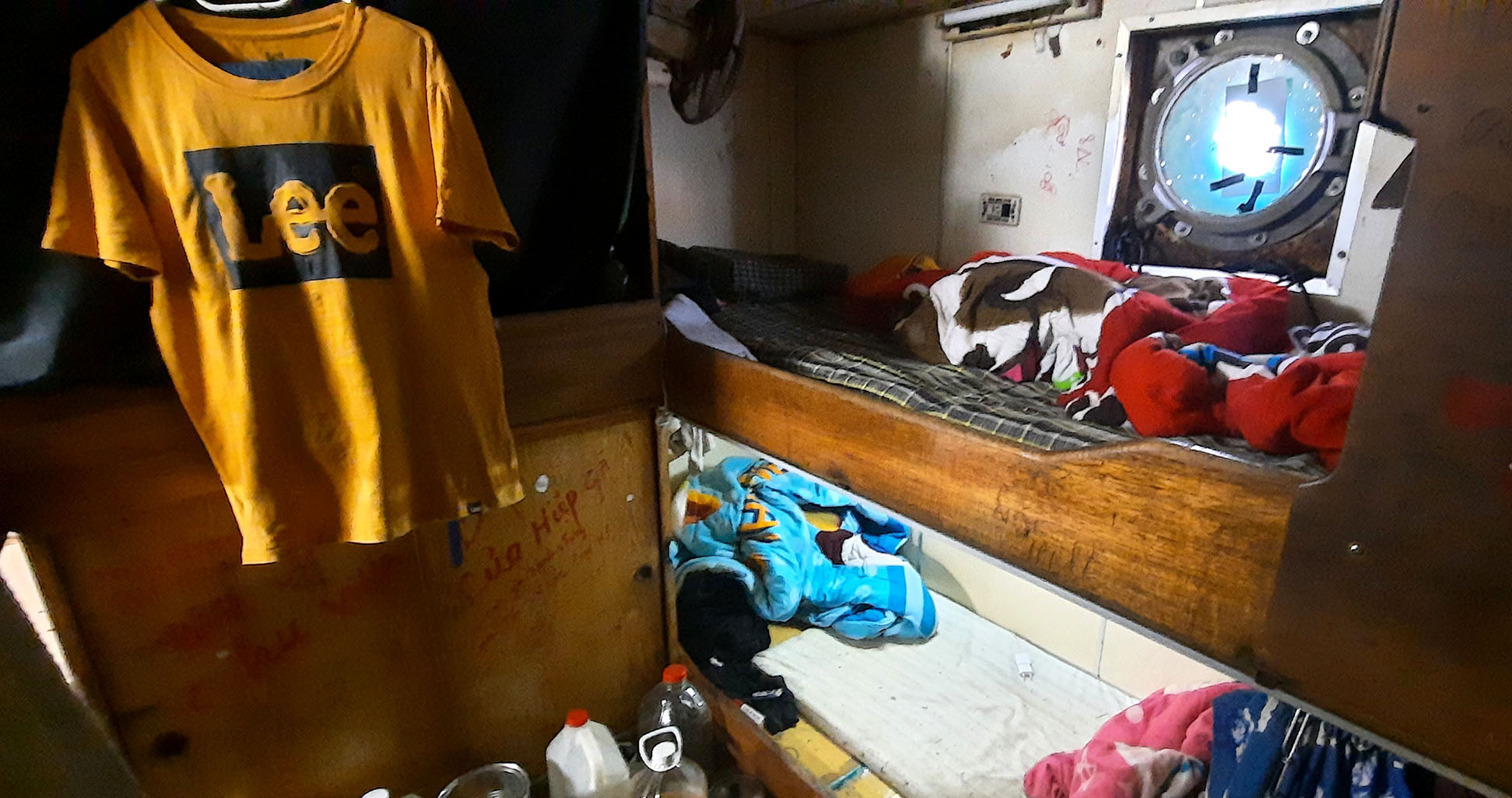
A cramped, smelly, claustrophobic cabin on the Hong Iu 313 offers little privacy and no storage space. (Photo: Don Pinnock)
Both countries have included labour standards as part of their fisheries reforms, including raising minimum wages and inspecting boats and crew going in and out of port. NGOs in countries where migrant workers are drawn, especially Indonesia and the Philippines, are pushing for greater attention and regulation of recruitment agencies. A good recruitment agency is a game changer.
Research by one of us (Melissa) says an important start would be that more countries sign the Work in Fishing Convention C188, which was drafted to lay down provisions for labour standards on fishing vessels, including regulating working hours. States that ratify C188 can inspect foreign fishing vessels in their ports, and detain vessels if they find that conditions on board are hazardous to the safety and health of crew.
South Africa was the first African country to ratify C188. However, only 21 coastal states have ratified the convention and few countries carry out port inspections. This places South Africa in a unique and important position: more inspections are needed.
A few other promising areas include the campaign Wi-fi Now for Fishers’ Rights! advocating for Wi-Fi access on all Taiwanese boats, port-based organisations such as Stella Maris, and the drive for greater unionisation of fish workers. Unionisation is critical if workers are to have a voice in collective bargaining.
But every day out of sight on the high seas where no country holds jurisdiction, fishers are working under conditions that none would tolerate in factories or farms in the home countries of the boat owners. Next time you eat fish, spare a thought for what it’s costing them. DM
Next: KILLING FISH. Part 2: The price of fish and chips
The impact of C188
The objective of C188, drafted by the International Labour Organization, is to ensure that fishers have decent conditions of work on board fishing vessels. C188 stipulates the minimum requirements for work on board; conditions of service; accommodation and food; occupational safety and health protection; medical care and social security.
It is unique in that it:
- Sets out minimum labour standards for work in fishing;
- Enables inspections of foreign fishing boats, for countries that have ratified C188. This can include reviewing contracts, ensuring crew have access to medical care, and understanding working hours on a particular boat; and
- Boats found in violation of C188 can be fined or detained.
Far more countries need to ratify C188, to ensure that forced labour is rooted out of fishing, particularly on the high seas.
Response to this article by the Taiwanese Fisheries Agency
We acknowledge this reply to the above article from the Taiwanese fishing Agency which we publish in part below (too long for full publication). We acknowledge that, under pressure from the United States and the European Union, Taiwan has undertaken corrective actions to improve conditions on its deep-water fleets and this is to be applauded. It has also taken significant steps to tackle illegal, unreported and unregulated (IUU) fishing issues. However, according to a US Congress report, Taiwan has not comprehensively resolved all issues, including violations of human rights on the high seas.
In September 2022, the US Department of Labor included Taiwan’s fish products in the List of Goods Produced by Child Labor or Forced Labor for the second time. According to a recent report – Taiwan’s Distant-Water Fleet Still on Troubled Waters – “the mistreatment of migrant fishers and the problem of forced labor in the high seas overshadow(s) the nation’s reputation as one of the leading democracies and economies in Asia.” See Rough Waters: Taiwanese fishing boats reeling from forced labour charges. There is clearly more work to be done to protect the deep-water fleets migrant crews.
The Taiwanese Fisheries Agency responds…
In the article, the vessels, HONG IU NO.313, CHIN CHANG LONG, HUNG CHUAN NO.212, Hsiang 101, JAIN LIH NO.212, and YONG QING FA NO.666 have been specifically outlined by the author. Consequently, this report aims to respond to and explain the circumstances of these vessels, in addition, to refute the false accusations made by the publisher.
Hong Iu 313
While the vessel was at port in Cape Town on 31 March 2023, the results of the inspection conducted by the SAMAS was that “the accusations were unfound and untrue” with such accusations indicating that the vessels had problems including insufficient wages, food and drinkable water were not in compliance with the claim made by the news publisher. [The accusations were made in independent interviews with the crew – ed]
Chin Chang Long
The result of the autopsy showed that the crew’s death was a natural mortality. The vessel’s operator had transferred the remaining wages in an amount of 3,598 USD and an indemnity insurance with a sum of 48,185.03 USD to the account of the crew’s mother, in addition to achieving reconciliation with the crew’s families. Subsequently, the Fisheries Agency had also offered 100,000 TWD as a death gratuity to the crew’s families.
JAIN LIH 212
On 2 September 2022, the Fisheries Agency had received information from the vessel’s operator indicating that one Filipino had no vital sign while other crew members were trying to wake him up for meal. After providing emergency treatment, he still had no vital signs and was deemed to be deceased. In accordance with the certificate issued by the Medical Unit of the police department of Candos (Mauritius), such mortality was attributed to acute coronary insufficiency. The vessel’s operator and the crew’s families had achieved reconciliation and paid the remaining wages with a sum of 2,535 USD, in addition to providing an additional 1,000 USD as the funeral grant and 5,000 USD as the death gratuity. In addition, the Fisheries Agency had also offered 100,000 TWD as a death gratuity to the crew’s families.
Hang Chuan 212
Because the vessel is currently navigating at sea, the investigation regarding the accusation will be conducted once the vessel returns to port.
Hsiang 101
The vessel, “Hsiang 101”, indicated in the report could not be identified in the database. However, in accordance with the port’s record of Cape Town, the vessel is considered to be RUEY I SHYANG NO.101. However, there is no relevant information provided by the crew members onboard the vessel regarding the incident during the inspection conducted by Fisheries Agency in November 2018, and such issue was also not be mentioned during another inspection conducted by Société Générale de Surveillance (SGS. S.A) in September 2023. If Daily Maverick, could provide detailed information regarding the vessel, it would be helpful for the Fisheries Agency to conduct further investigations regarding the accusation. [The report came from the files of Stella Maris following interviews with crew members – Ed]
YONG QING FA NO.666
After being penalised and revoked of its fishing license by Fisheries Agency, the vessel was detained at the port in Cape Town with two Taiwan nationals and four Myanmar nationals onboard. The 4 Myanmar nationals had been repatriated on 20 March 2020 with the assistance of Taiwan’s government, and the relevant fee had been paid by the government.
Conclusion and Suggestion
Fishery Agency had imposed a penalty on the vessel operator of, Hong Iu 313, due to violation of provisions of domestic law. The Agency had also assisted the families of the crew members onboard the vessels, ‘Chin Chang Long’ and ‘JAIN LIH 212’ in applying insurance indemnity and collecting the remaining amount of wages. The Agency had also issued 100,000 TWD as death gratuities to those crews’ families.
In addition, regarding the four detained Myanmar nationals onboard YONG QING FA NO.666 at the port in Cape Town, the Fishery Agency had assisted the crew members in returning to their home country and paid for the relevant fee based on humanitarian principles.
In 2022, Taiwan had ratified the “Action Plan for Fisheries and Human Rights” and improved human rights in fisheries by recruiting labour inspectors, increasing labour inspection, and mandating the installation of CCTV, in addition to subsidizing the operators with installation of Wi-Fi onboard distant water fishing vessels. Fisheries Agency suggests that all news publishers shall be neutral while publishing such information, in case of causing any undesirable impact to the vessels’ operators and industry.
A fishing vessel is considered to be private property. If the correspondent or journalist embarking and taking photos onboard Taiwan-flagged vessels without any permission, he/she may have violated the privacy of the operators.
Except the unidentified vessel, “Hsiang 101”, the Fisheries Agency had taken responsibility in penalising the vessel that violated the relevant regulations and immediately settling the crew members’ mortality onboard fishing vessels, in addition to repatriating the crew members based on humanitarian principles. Regarding the accusations of vessels violating the regulations, the Fisheries Agency insists on the principle of justice and law while resolving relevant issues and makes all efforts to take responsibility as the flag state.DM




















 Become an Insider
Become an Insider
Sadly, this will only stop when the world’s oceans are depleted of fish
Thank you. We all need to know about this. I look forward (not the right expression given the subject, but the best I can come up with) to Part Two.
Man’s capacity for cruelty is never ceasing
Humans exterminating species, is nothing new. The oceans held out longest for obvious reasons. But their time has come. There are too many pirates and too few police. The outcome is inevitable. Many documentaries paint the same, bleak picture and scientist predict total collapse of ocean fishstock by 2050 or so. The End Of The Line is worth watching:
https://youtu.be/x42Ksy8gnBY?feature=shared
This is shocking. The human race has reached a stage where they are destroying everything around them and eventually themselves. Something has to change but greed seems to overwhelm any attempts at doing the right thing.
Misleading, this article has nothing to do with fried fish and chips !